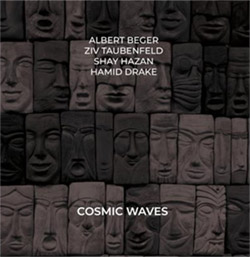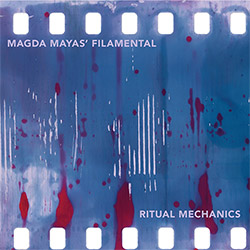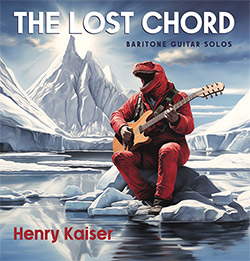
Two studies in the elongation of piano decay complemented by the harmonics and texture of the shō (a Japanese free reed instrument) using stillness and repetition in a two part extended work by NY-based Swiss comoposer Samuel Reinhard, performed by Copenhagen pianist Paul Jacob Fossum and Japanese Gagaku musician Haruna Higashida; an album of beautifully meditative pools of sound.
In Stock
Quantity in Basket: None
Log In to use our Wish List
Shipping Weight: 2.00 units
Sample The Album:
Samuel Reinhard-composer
Haruna Higashida -sho
Paul Jacob Fossum-piano
Click an artist name above to see in-stock items for that artist.
Label: elsewhere
Catalog ID: elsewhere 032
Squidco Product Code: 34939
Format: CD
Condition: New
Released: 2024
Country: USA
Packaging: Cardboard Gatefold
Recorded at Studio Dede in Tokyo, Japan by Akihito Yoshikawa, and at The Royal Danish Academy of Music in Copenhagen, Denmark by Juan Felipe Arce Bayona.
"I've long been interested in exploring the elongation of the piano's decay. The shō's clean harmonics offered an enticing texture to incorporate into my experiments with slow-moving piano works." - Samuel Reinhard
To be slow and to be still: through his ongoing explorations of repetition, New York-based Swiss composer Samuel Reinhard extends this invitation to both listeners and the musicians who perform his compositions. 'For Piano and shō' brings together Haruna Higashida, a Tokyo-based gagaku performer active in contemporary music, and Copenhagen-based Canadian pianist Paul Jacob Fossum, who also performed on Reinhard's 2023 release 'Two Pianos and String Trio'. The album's two pieces were recorded between Copenhagen and Tokyo, where Reinhard was in residence in 2023.
In the first piece, recorded in a multitrack session, three pianos pursue and repeat their respective thread-like motifs, slowly encircling each other, each at their own pace. The pianos are accompanied by three shōs, playing individual notes and chords from a circumscribed pool of material and providing harmonic "reflections" of the melodic motifs played by the pianos. Together, the resulting material is ever-changing. In the second piece, a piano moves through a trio of figures-an arpeggio, an improvisation, a chord-for the duration of the performance. Each iteration of this sequence is accompanied by a single shō, which freely selects and plays a note or chord, emerging from the piano's first figure and disappearing into the third.
Throughout, players hold notes through touch or breath until sound decays. Small improvisations, a piano note coming into contact with the delicate asymmetry of the shō's intervals, dissolve into pools of deepening quiet. Reinhard has remarked that, by giving performers freedom to play less or more within a given duration, they are able to "do nothing and just listen for periods of time as they are performing, creating a kinship between the performer and the listener-where both engage in a deep and concentrated way of listening." Here, the shared act of listening, completed by the piece's audience, leaves its mark as an afterglow-a sensation of time stretched, all the details and feelings that emerge from a world slowed. "-elsewhere
"The shō (笙) is a Japanese free reed musical instrument that was introduced from China during the Nara period (AD 710 to 794). It is descended from the Chinese sheng,[1] of the Tang Dynasty era, although the shō tends to be smaller in size than its contemporary sheng relatives. It consists of 17 slender bamboo pipes, each of which is fitted in its base with a metal free reed. Two of the pipes are silent, although research suggests that they were used in some music during the Heian period. It is speculated that even though the pipes are silent, they were kept as part of the instrument to keep the symmetrical shape.[2]
The instrument's sound is said to imitate the call of a phoenix, and it is for this reason that the two silent pipes of the shō are kept-as an aesthetic element, making two symmetrical "wings". Similar to the Chinese sheng, the pipes are tuned carefully with a drop of a dense resinous wax preparation containing fine lead shot. As (breath) moisture collected in the shō's pipes prevents it from sounding, performers can be seen warming the instrument over a small charcoal brazier or electric burner when they are not playing. The instrument produces sound when the player's breath is inhaled or exhaled, allowing long periods of uninterrupted play. The shō is one of the three primary woodwind instruments used in gagaku, Japan's imperial court music. Its traditional playing technique in gagaku involves the use of tone clusters called aitake (合竹), which move gradually from one to the other, providing accompaniment to the melody.
A larger size of shō, called u (derived from the Chinese yu), is not widely used, although some performers, such as Hiromi Yoshida and Ko Ishikawa, began to revive it in the late 20th century."-Wikipedia
Artist Biographies
• Show Bio for Samuel Reinhard "Samuel Reinhard (b. 1980) is a Swiss composer. Guided by minimalist and aleatoric tenets, Reinhard's work emphasizes repetition and extended duration. His compositions are not unlike tapestries, built from shifting horizontal threads between which emerge unexpected resonances as they iterate and layer. From a distance unassuming and all but eventless, Reinhard's work is nonetheless driven by constant, subtle inner change. In his compositional practice he engages with sonic matter and processes like instrumentation and recording on a granular level, while interrogating and exploring the intricacies of perception and the act of listening itself. He earned his MA in Contemporary Arts Practice (Music & Media Arts) from Bern University of the Arts, and has been awarded grants and artist residencies from the Swiss Arts Council, the Music Commission of the City of Bern, the Department of Culture of the Canton of Bern, and others. Reinhard lives and works in New York City." ^ Hide Bio for Samuel Reinhard • Show Bio for Haruna Higashida "Haruna Higashida is a modern-day Gagaku, a professional of the ancient Japanese arts of court music and dance. A virtuoso of the Shō (mouth-organ) and the Biwa (lute), she also excels in the Umai, the elegant dance of the courtly right. From a young age, Haruna's musical voyage was marked by a diverse background, including choir singing and playing wind instruments like the alto saxophone and clarinet. Her pivotal encounter with the Shō during high school unveiled the captivating realm of its haunting melodies, steering her towards the specialty of Gagaku. She then went on to graduate from the Tokyo University of the Arts, specializing in Traditional Japanese Music. Beyond her mastery in classical Gagaku, Haruna has ventured into collaborative territories, merging the profound traditions of East with the innovative expressions of the West. This blend has not only enriched her musical palette but also expanded the boundaries of traditional Japanese music. Currently, Haruna is passionately engaged in outreach with Japan's youth, introducing them to the enchanting world of Gagaku. Her work illuminates the timeless beauty of this art form, fostering a new generation's appreciation for traditional Japanese culture." ^ Hide Bio for Haruna Higashida • Show Bio for Paul Jacob Fossum "Paul Jacob (PJ) Fossum is a Copenhagen based pianist, synthesist and composer. Born and raised in Canada, he studied classical music in his childhood, and grew into more rhythmic and improvised musics in adolescence. He moved to New York to study at The New School for Jazz and Contemporary Music where he studied with Reggie Workman, Sam Yahel, Jane Ira Bloom and Kirk Nurock among others. While in New York he dove headlong its jazz and improvised music scenes, being moulded into a versatile and genre defying artist. In 2020 he moved to Copenhagen to pursue a masters degree in performance at the Rythmic Music Conservatory with research into electro-acoustics pertaining specifically to the piano and transducers. He is currently touring with his solo-project electro-acoustic project Amalgamation-Integration using an electronics-augmented piano. He also works in a duo called Estuary with New York-based vocalist/composer Judette Elliston. Additionally he composes site-specific pieces, including: Guitar Summit CPH 2024 for 30 guitars and room (2024); Music for 5 Pianos (2022); TEXTING suite for small improvising ensemble, audience, and cell phones (2023); and Svømme for 5 spatialized transducer-piano sound-system, and 9 piece ensemble (2022)." ^ Hide Bio for Paul Jacob Fossum
6/27/2024
Have a better biography or biography source? Please Contact Us so that we can update this biography.
6/27/2024
Have a better biography or biography source? Please Contact Us so that we can update this biography.
6/27/2024
Have a better biography or biography source? Please Contact Us so that we can update this biography.
Track Listing:
1. For Piano and Sho I 20:42
2. For Piano and Sho II 20:27
erstwhile
Compositional Forms
Ambient & Minimal Music
Duo Recordings
Woodwinds
Piano & Keyboards
European Improvisation, Composition and Experimental Forms
Japanese & Asian Improv/Rock
New in Compositional Music
Recent Releases and Best Sellers
Search for other titles on the label:
elsewhere.













